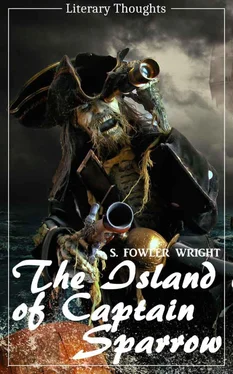When they found that this did not deter him, they named a figure which they probably thought would be prohibitive. But in the end they had agreed, though with obvious reluctance, and after a quarrel between themselves, which he had partly overheard, though he did not understand its meaning. In view of what he knew later, he was surprised that they had consented at all—unless they were each so afraid of the treachery of the other that they welcomed even a stranger, who must be an embarrassment later. Unless, of course, he were—removed.
He did not know, even now, what dark secrets might explain the events that had followed—which do not concern us now—though it is a tale which might be worth the telling. He only knew that, after a load, of whatever nature, had been taken aboard in the night-time from a nameless beach, they had burst into a sudden quarrel, in which knives had been drawn, and from which they had been separated by the efforts of a crew that appeared to consist about equally of the adherents of either.
And then, on a later night, when he had lain on deck, as he sometimes did, unsuspected in the shadows, and they were anchored beside another nameless beach, a boat had been lowered and stealthily loaded by the men who held the watch, one of the partners superintending. And just as it appeared that the work was finished, the other had rushed up, with his party behind him, and the deck had become the scene of sudden violence, oaths, bare knives, and pistol-shots, and the cough of a dying man.
On a moment's impulse he had dropped over the side into the loaded boat as the nearest safety from the flying shots of a quarrel which did not concern him, and then become aware, with mingled feelings, that the mooring-rope had parted, and that he was adrift on the ocean.
The distance had widened rapidly from the anchored schooner, while the noise of the fight continued and fell. After an interval of silence, he had heard two shots, and had supposed that the victorious party were disposing of what remained of their opponents. Then there had been a brief silence again, and then a pandemonium of cries that told that the loss of the boat had been discovered.
Should he hail them? He had experienced a natural hesitation. There would be so little difference in one shot more, and one more corpse for the sea's disposal. And, while he doubted, he drifted further away, into a momentary security, for the night was dark and starless.
As he drifted thus, he realized that his peril might be greater for his silence, were he to be in sight of the ship when the dawn rose, and that his alternative was to be an outcast in the loneliest wastes of the Pacific, where a thousand miles were unsailed and uncharted. But even while he realized his dilemma, the difficulty of explaining his silence had increased, and the distance widened. The ennui of his physical condition inclined him to the choice of inaction. The cries grew fainter, and died away.
The dawn showed him an open ocean without sail or sight of land.
It was typical of Charlton's disposition, though a condition of health rather than character, that, having assured himself that his rear was secure, and decided his purpose, he was in no haste to commence it. He became conscious that he was hungry, and ate a meal at his leisure. Having done this, he was increasingly aware that he was tired from a night's vigil, and from the toils in which he had spent it. As the time passed, and there came no threat from the dark aperture above him, he became assured that it held no menace. He did not resolve on sleep, rather it resolved upon him, as he ignored it idly. In the end, sleep he did, and for some hours though his sleep was light and watchful.
Doubtless, when he awaked, he was the better for sleep and food, and he went about his preparations with a careful deliberation. In the boat there was a lantern, which he lit, and, having no belt, he fastened it round him with a length of rope. He placed a loaded revolver in a righthand pocket.
He looked with hesitation at a very serviceable sword, straight and sharp, neither too light nor too heavy, which was among the boat's offensive equipment, but he rejected the thought. It was unlikely enough that he would meet with any living thing. If he should do so, they might not be unfriendly. If they were doubtful in their demeanor, a display of weapons would not increase their good-will. More definite in its objection was the fact that he was not used to the wearing of such a weapon, and that it might impede his legs in climbing. Every way the revolver was best and should be sufficient.
The climb was not easy.... The supports, though firm enough, of whatever age or metal, seemed very far apart. The foot-holes were sometimes difficult to find. Clinging closely to the face, of the rock, he had to grope for them with a free foot, the hold of the other sometimes feeling insecure as he did so. He wondered whether the staples would hold, were his whole weight suddenly dragged upon them. He did not like the thought of falling upon the hard stone below. He imagined himself there with a broken leg, struggling to get into the boat before the returning water should drown him—and his life afterwards, if he should be able to live under such conditions. The penalties of accident are heavy to a lonely man.
His arms ached badly. Probably he threw more strain upon them than a more accustomed climber would have done, and his muscles were unused to such effort.
When it seemed that he could climb no more, he realized that it might be harder to return than to continue. He rested for a few moments, so far as rest was possible in such a posture, and started upward again. A doctor might have told him that such experiences were all that were needed to complete a cure that the sea-winds had made possible. A man may die in a gradual lethargy, thinking that he has no will to live, who would yet be roused by a sudden threat of death, before he had gone too low for his will to wake to the conflict.
He was impeded also by the lantern, which would not keep clear of the wall, as he had designed to sling it, but he was glad of its light when he came at last to a place of landing.
At least—should he land? For some time he had left behind the open space of the tunnel and had been ascending a narrow shaft about a yard square. It still continued upward into the darkness, but behind him there was now an opening into an unlighted chamber. Loosing one hand, he leaned sideways from the wall and raised the lantern. He saw nothing but a bare rock floor and an empty darkness.
He was aching to rest his straining arms, and for the security of a solid floor, but still he hesitated. He did not doubt that he could step safely to the floor that was about three feet behind him—but the return? He thought that it might not be so easy to reach forward and clutch the rings, or to stride over vacancy to those precarious footholds. He had a vision of starving there with all his stores beneath him. The bare darkness of the chamber gave no promise of hospitality, nor probability of exit. It might be that the way out (if way there were) was to continue upward.
While he doubted, weariness resolved the problem. He was too exhausted for descent or for further climbing. He reached out a foot, felt firm rock, leaned his weight upon it, and landed easily.
After a short rest, he commenced to explore the chamber. He was not keenly curious, nor did he feel anxious as to what he might discover. The physical exhaustion following the exertions of the night and day, acting on a body which was still searching for health rather than in possession of it, left his mind dull and aloof from his surroundings, now that the need for further effort had lost its urgency.
The lantern showed him a rock chamber, bare and black, about ten feet high, and of about twice that width. Its length was greater, and the light was insufficient to reveal it fully. He judged that its direction was toward the cliff-face, which limited its possibility.
Читать дальше












